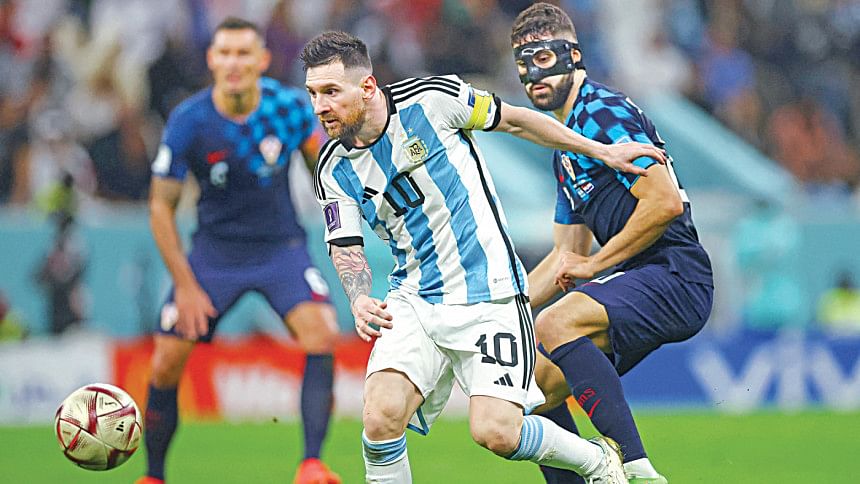Describing Messi’s Eroica Symphony

The world has long run out of superlatives to describe Lionel Messi in a new light. "Don't describe him, just watch him," one of Messi's mentors Pep Guardiola had said.
It is easier said than done though. Then again, it may be less difficult to invent new words.
On that note, it was "messilicious" how Argentina's No.10 pulled another rabbit out of his hat against Croatia, leading to the third goal -- an iconic moment in World Cup history.
It can be argued that the way he assisted that goal may not rank among his best-ever, given how he operated as a playmaker in his prime years -- dictated by his unique ability to accelerate, while the ball staying glued to his feet, when defenders thought he had reached top speed.
Could that goal jump up in the top hierarchy of his numerous jaw-dropping goals and assists? Perhaps no, but given the occasion and the context of the semifinal on Tuesday, the answer should be an astounding affirmative.
Argentina comfortably led two-nil past the hour mark but, as the Albiceleste have repeatedly shown in Qatar prior, this cushion happens to be a dangerous one for Messi and Co.
A World Cup final at stake, in his last dance as well, Messi took it upon himself to put the game to bed. Josko Gvardiol and the Croatia defence did little wrong during the move, but the planets had aligned; time about to stand still.
Minute 69. Messi was the furthest Argentine player with the ball in the right touchline, just above the midfield, man-marked by Gvardiol – one of the standout defenders in the tournament – supported by the experienced Dejan Lovren. Messi receives a short pass from Julian Alvarez and controls the match ball Al-Hilm on the bounce and swooshes past Gvardiol from the outside.
One touch, two touch and more, Messi and the Al-Hilm come in contact five times during his burst, with Gvardiol chased but failed to dispossess, after which La Pulga (the nickname given by Catalans back in the days, meaning "The Fly") looks to the left for a split second to see any passing option but Alvarez had lagged behind; and one could not blame him.
Here's the thing. Messi in his 20s would take Gvardiol on and cut inside and give the same treatment to Lovren before unleashing an unstoppable shot. Here, the maestro is 35, without familiar fuel in tank, and so taking on a fresh pair of legs in Lovren becomes a risky move. However, he has the wisdom of an old monk these days.
If Messi is a classical music composer, he visualizes the staff notation before the melody plays in his mind. Gvardiol had operated by the textbook, preventing the threat from reaching the spine, as Messi ended up in a seemingly less dangerous position than before with his back facing the goal. Until he was not.
Messi demonstrated, as he did on numerous occasions, that silence is the canvas from which music is created.
Staying outside Gvardiol throughout the run, Croatia defence did not feel the need to call for reinforcement. But Messi knew what they did not and was about to play the game of reverse psychology to perfection.
With a dummy and a twist, he wrestled past an already-exhausted Gvardiol, who did his best to keep up though. Suddenly The Fly was well inside the box, with two passing options against three defenders, and found Alvarez between the outstretched legs of Gvardiol before the ball received its due destination as the Croatia defence, including Luka Modric, appeared to be caught ball watching.
General audience may remember Messi's run as one of his many goals. It was not though, as for Messi, in twilight of his career, had composed his own version of the "Eroica (Heroic) Symphony" – the great Beethoven masterpiece, created following a profound crisis related to his worsening deafness.

 For all latest news, follow The Daily Star's Google News channel.
For all latest news, follow The Daily Star's Google News channel. 



Comments